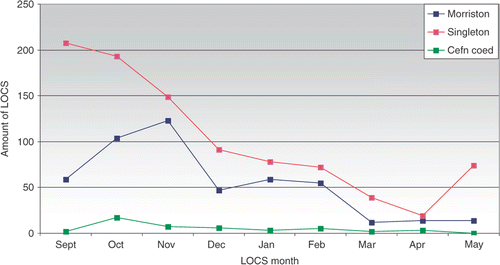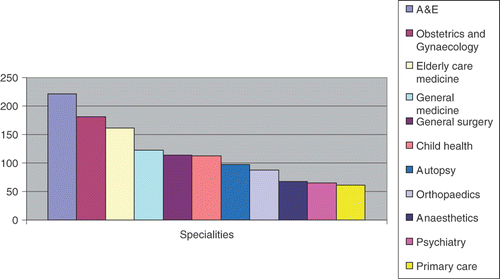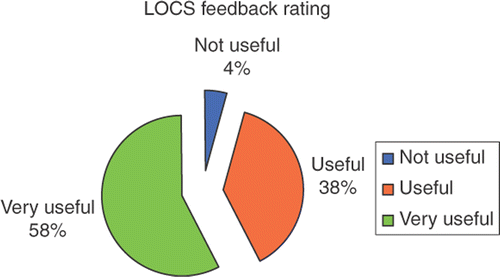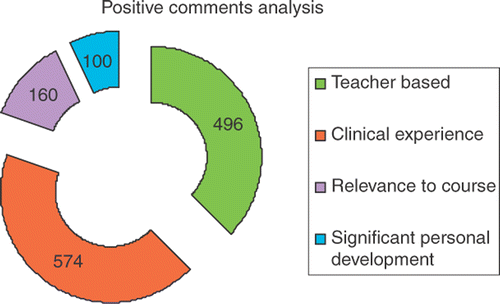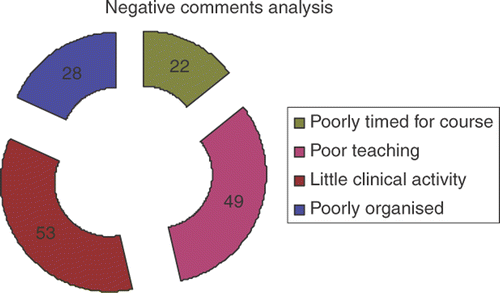Abstract
Introduction: Graduate-entry medical programmes (GEP) have been introduced into many UK universities. Their shortened 4-year programme may restrict exposure to the clinical environment. The GEP at Swansea University has introduced Learning Opportunities in the Clinical Setting (LOCS), a novel approach, allowing students to choose half day sessions from a list which aimed at bringing experiential clinical learning to first and second year students on the course.
Methods: During the academic years 2007–2008 and 2008–2009, student feedback was collected anonymously online with the options ‘very useful’, ‘useful’ or ‘not useful’ followed by a free text box space to feedback their experience. The text was assessed using qualitative analysis methodology.
Results: A total of 730 LOCS feedback comments were analysed, 422 were recorded as ‘very useful’ (58%), 276 were ‘useful’ (38%) and 32 ‘not useful’ (4%). Students’ feedback were divided into positive (1330) and negative (152) comments. Positive themes were broadly divided into four categories: Positive Teacher experience, Positive Clinical experience, Relevance to the course and significant Personal Development.
Conclusion: The LOCS system provides an efficient method of providing students with a choice of additional learning opportunities which has proved popular and, in the opinion of students, educationally effective.
Introduction
Graduate-entry medical programmes (GEP) have been introduced into many UK universities and while their shortened 4-year programme may restrict exposure to the clinical environment when compared to a 5-year course, it does not seem to affect measurable outcomes (Rolfe et al. 2004; Manjeet et al. Citation2010)
The GEP, a partnership between Cardiff and Swansea Universities, started in 2004. In an attempt to increase early clinical contact, a system of Learning Opportunities in the Clinical Setting (LOCS) was introduced to years one and two of the 4-year course. The specific aims were to facilitate the integration of the knowledge-based learning into clinically useful concepts and skills and to allow students to gain early experience to aid career choice. LOCS provide students with access to an extensive range of clinical activities at three Swansea Hospitals of the Abertawe and Bro Morganwg University Local Health Board (Singleton, Morriston and Cefn Coed Hospitals).
The recent edition of Tomorrow's Doctors (GMC (UK), 2009) can be seen as driving medical schools towards a more outcome and competency based model. This is perhaps contrary to those who suggest that learning should be based on a more experiential, opportunistic model (Charlotte Citation2009; Gillian & Janet Citation2000). The difficulty with using an experiential model is that it makes it difficult to demonstrate educational efficacy, as there are no predefined achievements for students to demonstrate (Doris & Chaput Citation1997). This study aimed to use a qualitative methodology to determine whether students felt LOCS were educationally valuable and how they were being used.
Methods
Students are required to attend at least 10 LOCS in each of their first and second year and must complete a minimum set number of LOCS in specific specialities including medical specialities, surgical specialities, accident and emergency and obstetrics. The emphasis is on experiential learning and formative feedback and although there is no formal assessment, lack of engagement or unprofessional behaviour could result in further action.
Each LOCS may be booked online through a locally developed interface and are selected from a list of over 500 different opportunities. The session is then confirmed with the relevant clinician by administrative staff with a confirmation email sent to the student. Each has a minimum duration of 3 hours and attendance must be confirmed by the supervising clinician. Examples of LOCS include attendance of the Accident and Emergency department, theatre sessions, out patient clinics, ward rounds as well as observation of specialist procedures including endoscopy, post mortems and radiological imaging. Sessions are also available in out of hospital areas such as occupational health, paramedic practice as well as prisons, community homeless and drug abuse centres. The database consists of activities occurring every working day of the year and provides a vast range of different learning opportunities for students to pursue their particular interest. highlights a small example of the wide ranging opportunities for learning in an average week based at the three hospital sites. Following the students’ activity, they are required to anonymously rate the LOCS online with the options ‘very useful’, ‘useful’ or ‘not useful’ followed by a free text box space to provide feedback on their experience. Failure to complete the online registration of completed LOCS results in a failure to progress to the next year of study.
Table 1. Brief selected highlights of LOCS on an average week.
Following institutional ethic committee approval, statistical LOCS data from the academic year 2007–2008 were analysed. Scores and feedback for the academic year 2008–2009 were also analysed by the primary author, who had little contact with the students and who was not committed to any particular theoretical educational approach. This aimed to minimise imposing any pre-existing interpretation onto the analysis. The data was extracted into a spreadsheet and then read and re-read until themes emerged, using a grounded theory approach (Glaser & Strauss Citation1967). Subsequent discussion between two authors (Saqib Noor (SN) and Aidan Byrne (AB)) served to develop and refine the themes until no additional data emerged. These themes were converted into a coding structure that was then applied to the available data. Each comment was coded as containing one or more of the themes emerged, producing the numerical data used in the results section.
Results
Data related to a total of 142 GEP students in the first and second year who attended a total of 1767 LOCS (1038 at Singleton, 664 at Morriston and 65 at Cefn Coed Hospitals) in 2007–2008. The number of LOCS completed each month varied across the academic year, with October being the busiest month, before tailing off towards the end in February, March and April (). On average, each student attended 12.4 LOCS in the academic year. Accident and Emergency was the most popular (221 attendances), although a wide range of specialities were involved ().
Feedback from the 2008–2009 academic year showed the majority of the LOCS as being positive learning experiences. Of these, 422 were recorded as ‘very useful’ (58%), 276 as ‘useful’ (38%) and 32 as ‘not useful’ (4%) ().
Initial analysis revealed a division into positive (1330) and negative (152) comments. Positive themes were broadly divided into four categories: Positive Teacher experience, Positive Clinical experience, Relevance to the course and significant Personal Development (). Examples of positive comments are shown in .
Table 2. Examples of positive feedback.
There were 496 Positive Teacher comments, often relating to the approachability of staff and the excellence of teaching.
Positive Clinical experiences () were related to three main activities, observing clinical activity, direct patient interaction and hands-on clinical skills. Observing clinical activity (384 comments) described positive experiences witnessing autopsies, operations and investigations. Direct patient interaction (127 comments) included history taking or examination and hands-on skills practice (63 comments) included comments describing learning cannulation and airway skills.
Relevance to other components of the course (160 comments) related mainly to anatomy but also pathology, physiology and basic clinical skills. Autopsies and surgical LOCS were highlighted on numerous occasions as beneficial for anatomy, whereas procedures such as endoscopy, out-patient clinics and cardiorespiratory investigations were often cited as integrating basic science knowledge ().
Personal Development often described an exceptional experience that allowed the student to develop or reflect in more depth on their learning and career ambitions. First time experiences such as witnessing and assisting on the delivery suite, observing autopsies or assisting in operations were often described as thought provoking, rewarding or inspirational ().
There were 152 negative comments (), which were themed into the following categories: Limited Activity of the teaching in relation to the course, Poor Teaching, Poor Organisation and Inappropriate Timing. Examples of negative feedback comments are highlighted in .
Table 3. Examples of negative feedback.
Limited clinical activity (53 comments) was often related to units with variable workload such as Accident and Emergency departments or Labour Ward.
The quality of teaching (49 comments) related to clinicians ignoring or not interacting with students and was present across most specialties ().
Poor organisation of the LOCS (28 comments) related to the students’ presence being unexpected or having the LOCS cancelled without notice or inaccurately described in the database ().
Inappropriate Timing (22 comments) described LOCS that would have been beneficial but were felt by the student to require greater knowledge or more experience ().
Discussion
We must first recognise that the opinions presented here are those of students in the early phase of their medical education and it would be naïve to assume that their approval equates directly with educational efficacy. However, the positive feedback and additional 2.4 ‘non-mandatory’ LOCS attendance per student/year suggest that the LOCS were both a popular and an educational activity. This provides an example of providing students with a range of learning opportunities and allowing them to ‘vote with their feet’ (Cardall et al. Citation2008), recognising that students may have a range of learning styles (Kieran Citation2007).
The number of LOCS attended did reduce significantly towards the end of the academic year with students being very keen to attend early on. This decline coincides with the written examination dates of the course at the end of the year. This flexible system therefore allows students to manage their time and clinical activities appropriately, allowing them to focus on written examinations when necessary.
The positive feedback indicates that LOCS have achieved their main aim of allowing students an opportunity to integrate their early knowledge-based learning. In addition, the large number of comments relating to the clinician, clinical practice and personal development support the concept that effective experiential learning is taking place, with students not just learning the technical aspects of medicine, but also learning about the meaning of being a doctor. This is important as other authors have indicated that students within the first two years of a medical course may need to develop their ability to reflect (Niemi Citation1997).
However, negative comments appeared to relate to either a lack of clinical activity or a teacher who was not able/prepared to teach. While the variability of clinical work in some areas will inevitably lead to disappointment for some students, better communication of staff holidays, for example, may reduce some variability. The poor teaching identified in a minority of LOCS will be addressed by improved staff training and will inevitably result in some sessions being removed from the list of available sessions.
The reports from students that they did not have the necessary knowledge or skills to make use of the LOCS, perhaps reflects an older style of medical education where the learning of basic science prior to clinical exposure was considered essential (Campbell Citation1976). We are aware that some of our students, despite being graduates, prefer a more directed learning environment and are not comfortable without defined learning objectives and supporting guidance (Moore et al. Citation1994). However, our ethos is that self direction, independent learning and a focus on the needs of the patient are essential for both students and doctors. Although LOCS could be used to identify students who need help to develop those traits, the system is not used for that purpose at present.
The LOCS system stems from a desire from the teaching staff to provide students with a rich, clinical education with multiple opportunities to experience clinical practice at the earliest opportunity. This approach is supported by evidence that clinical activity early in medical school life is not only related to later clinical confidence and job progression, but also to academic progress (Dornan et al. 2006). One original aim, of providing students with experiences on which to base future career choices, was not supported by the data.
The unstructured approach used is somewhat at odds with some current guidance, such as that contained within Tomorrow's Doctors, (GMC (UK), 2009) which emphasises the need for clinical experience to be structured and be linked to explicit outcomes. However, the same document also recommends the inclusion of student led learning and opportunities for experiential learning. Most importantly, the results suggest active, deep learning that not only supports academic progress, but also broadens the students’ concepts of professionalism and their own capabilities.
LOCS are also difficult to classify within any current scheme of curricular design (Anthony, Citation2010). They lack the links of an outcome based system, the group work of Problem Based Learning and are too ill defined to fit any case or subject based system. However, they do have the advantage of making use of many learning opportunities that might easily be excluded from a standard curriculum. For example, visits to a homeless centre, a prison and time spent on-call with paramedics would be extremely difficult to arrange for an entire year, but which can provide profound learning opportunities. Provided the ‘normal’ curriculum ensures students achieve the desired, compulsory outcomes, we feel that the LOCS system provides students with valuable additional learning opportunities.
The addition of any new learning opportunity to an already overcrowded timetable has inevitable consequences and we are aware that students have sometimes struggled to find enough free time. Since the introduction of this system, a new curriculum has been introduced with an approximately 50% reduction in large group teaching which has made the system much easier to manage. We would anticipate that if a system such as LOCS is to provide an effective learning resource, then a decrease in formal teaching is probably essential.
Acknowledgements
The authors would like to thank the administrative staff at the School of Medicine, Swansea University and at Singleton, Morriston and Cefn Coed Hospitals for their hard work in collecting and processing the data in relation to the LOCS. Their hard work and support is a major reason for the continued success of the programme.
Declaration of interest: The authors report no conflicts of interest. The authors alone are responsible for the content and writing of the paper.
References
- Anthony JL. Where is evidence-based instructional design in medical education curriculum development?. Med Educ 2010; 44: 536–537
- Campbell EJM. Basic science, science, and medical education. The Lancet 1976; 307: 134–136
- Cardall S, Krupat E, Ulrich M. Live lecture versus video-recorded lecture: Are students voting with their feet?. Acad Med 2008; 83: 1174–1178
- Charlotte R. Experiential learning: Another turn on ‘see one, do one’. Med Educ 2009; 43: 606–607
- Doris D, Mark Chaput S. Experiential learning. Med Educ 1997; 31: 25–28
- Dornan T, Littlewood S, Margolis SA, Scherpbier A, Spencer J, Ypinazar V. 2006. How can experience in clinical and community settings contribute to early medical education? A BEME systematic review. Med Teach 28:3–18.
- Gillian M, Janet S. Promoting professional knowledge, experiential learning and critical thinking for medical students. Med Educ 2000; 34: 535–544
- Glaser B, Strauss A. The discovery of grounded theory: strategies for qualitative research. Aldine Publishing, Chicago 1967
- Kieran W. Learning styles: Do they really exist?. Med Educ 2007; 41: 618–620
- Manjeet S, Thea H, Alec P-F, Colin M, Ian F, Stuart P, Edward P. Comparing the performance of graduate-entry and school-leaver medical students. Med Educ 2010; 44: 699–705
- Moore GT, Block S D, Style C B, Mitchell R. The influence of the New Pathway curriculum on Harvard medical students. Acad Med 1994; 69: 983–9
- Niemi P M. Medical students’ professional identity: Self-reflection during the preclinical years. Med Educ 1997; 31: 408–415
- Rolfe I E, Ringland C, Pearson S A. Graduate entry to medical school? Testing some assumptions. Med Educ 2004; 38: 778–786

